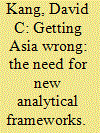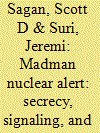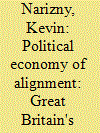| Srl | Item |
| 1 |
ID:
055724


|
|
|
| 2 |
ID:
055722


|
|
|
| 3 |
ID:
055721


|
|
|
|
|
| Summary/Abstract |
The People's Republic of China (PRC) is more integrated into, and more cooperative within, regional and global political and economic systems than ever in its history. Yet there is growing uneasiness in the United States and the Asia-Pacific region about the implications of China's increasing economic and military power. Characterizations of Chinese diplomacy in the policy and scholarly worlds are, if anything, less optimistic of late about China's adherence to regional and international norms. In the 1980s there was little discussion in the United States and elsewhere about whether China was or was not part of something called "the international community." Since the early 1990s, however, scholars and practitioners alike have argued increasingly that China has not demonstrated sufficiently that it will play by so-called international rules and that somehow it must be brought into this community. The subtext is a fairly sharp othering of China that includes a civilizing discourse (China is not yet a civilized state) or perhaps a sports discourse (China is a cheater).
Many of the most vigorous policy debates in the United States in recent years have been over whether it is even possible to socialize a dictatorial, nationalistic, and dissatisfied China within this putative international community. Engagers argue that China is becoming socialized, though mainly in thesphere of economic norms (e.g., free trade and domestic marketization). Skeptics either conclude that this is not the case, due to the nature of the regime (for some, China is still Red China; for more sophisticated skeptics, China is flirting with fascism), or that it could not possibly happen because China as a rising power, by definition, is dissatisfied with the U.S.-dominated global order (a power-transition realpolitik argument). A logical conclusion is that both groups view the problem of China's rising power as the primary [End Page 5] source of instability in Sino-U.S....
|
|
|
|
|
|
|
|
|
|
|
|
|
|
|
|
| 4 |
ID:
055725


|
|
|
| 5 |
ID:
055723


|
|
|
| 6 |
ID:
055726


|
|
|